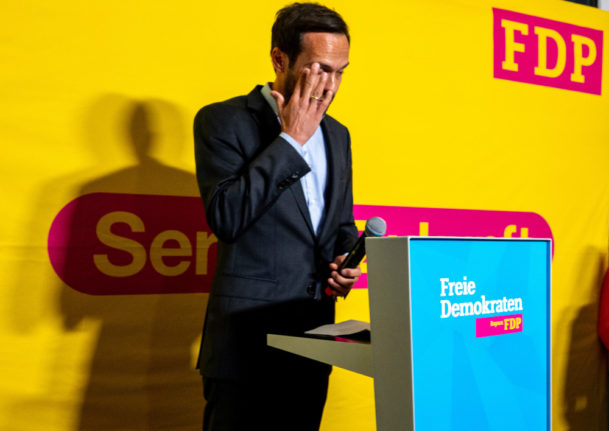All three parties in the coalition — Scholz’s centre-left SPD, the Greens and the liberal FDP — saw support fall Sunday in the southern region of Bavaria, the country’s biggest state, and Hesse in the west.
The main conservative opposition won in both polls, as expected, while the far-right Alternative for Germany (AfD) gained more ground, causing fresh concern about their growing appeal.
Nearly 14 million people were eligible to vote in the states, about one in five of Germany’s electorate. The polls were seen as a crucial indicator of the population’s mood, with surging immigration and economic woes among key topics.
“It is clear who won the vote: populism,” said news weekly Der Spiegel while the top-selling Bild said a whopping 80 percent of Sunday’s voters were calling for a change in migration policy, citing polling institute Infratest dimap.
READ ALSO: State elections: Why did the AfD do so well in Bavaria and Hesse?
Two years after coming to power, the polls were a kind of “interim report card” for Scholz’s coalition, Der Spiegel said.
“The results are disastrous,” it went on. “The coalition needs a reset if it wants to be re-elected in two years.”
For the anti-immigration AfD, the votes were the latest sign of growing momentum and showed their appeal was extending beyond their traditional strongholds in the ex-communist east.
The elections came after a torrid two years for Scholz’s government, which has had to contend with Russia’s invasion of Ukraine and an ensuing energy crisis that plunged Germany into recession.
The chancellor’s coalition has also been consumed by bitter infighting on issues ranging from climate laws to spending cuts.
However Scholz’s spokesman Steffen Hebestreit sought to play down the vote setbacks, saying the government was on course to tackle the most pressing issues facing the country.
“The chancellor is convinced that the government is doing a good job, that it has the right positions and is charting the right course for the longer term,” he told reporters.
Conservative strongholds
Both states are conservative strongholds. Hesse had been ruled for 24 years by the main opposition CDU and Bavaria since 1957 by the CSU, headed by Markus Söder.
The SPD had sought to gain ground in Hesse by fielding a heavyweight to run for state premier, Interior Minister Nancy Faeser.
But the party won just 15 percent of the vote, almost five percentage points below its last result in 2018.
The CDU maintained its first place in Hesse and extended its lead by over seven points to 34.6 percent.
State premier Boris Rhein is thus set to retain his job, while Faeser is left facing questions about her political future.
READ ALSO: State elections: What the results tell us about the future of German politics
The AfD gained about five percentage points in both Bavaria and Hesse, building on recent local poll wins, but the mainstream parties have ruled out cooperation with it in government.
The party’s co-leader Alice Weidel said the results showed the AfD had a right to participate in government, and that “further exclusion and discrimination would show an undemocratic disregard for voters”.
The AfD is “no longer perceived only as a protest party,” she said, adding that if the party comes second at national elections in 2025, in line with current opinion poll rankings, it would stake a claim to lead the country.
Immigration was a central theme at the polls as Germany — like elsewhere in Europe — faces a surge of new arrivals, reviving memories of a major influx in 2015.
The victory of the CSU — the sister party of the CDU — in Bavaria was widely expected and state premier Söder will retain his post.
But the party’s result was its worst in decades, potentially dealing a blow to his ambitions to one day run to be chancellor.



 Please whitelist us to continue reading.
Please whitelist us to continue reading.
Member comments